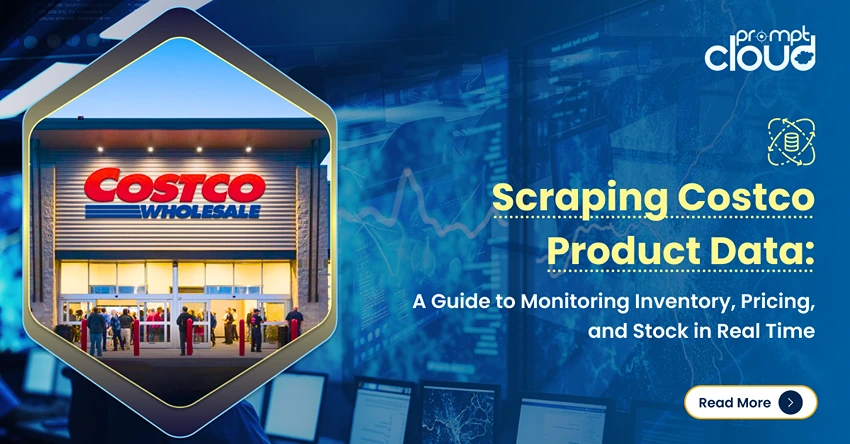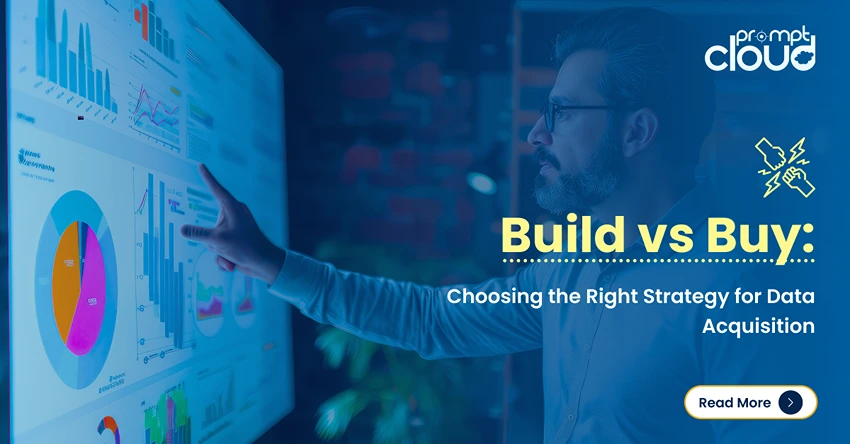
Data is the backbone of modern businesses, fueling insights, decision-making, and competitive strategies. Yet, as enterprises expand, so do their data needs. Traditional data management approaches – where businesses store, process, and analyze data within their own infrastructure are increasingly becoming inefficient, costly, and slow. Enter Data as a Service (DaaS), a game-changing approach that allows businesses to access, manage, and utilize data without the burden of owning the entire data pipeline.
What is Data as a Service (DaaS)?
Data as a Service (DaaS) is a cloud-based service model that enables enterprises to access real-time or batch data on-demand, without requiring extensive in-house data management. Similar to Software as a Service (SaaS), DaaS provides a scalable and flexible way to acquire high-quality, structured, and unstructured data, ensuring that businesses get the right information at the right time.
DaaS providers offer data from multiple sources, including web scraping, APIs, databases, and third-party partnerships. The data is processed, cleaned, and structured before being delivered, ensuring that enterprises can use it directly for analytics, AI/ML models, or decision-making processes.
Why Data as a Service (DaaS) is the Future of Enterprise Data?
The shift towards DaaS is driven by several industry trends and challenges that businesses face today:
- Explosion of Data Volumes – With the rise of digital transformation, enterprises generate and interact with more data than ever. Storing and managing this data in-house is not always viable.
- Demand for Real-Time Insights – In fast-moving industries, outdated or inaccurate data can lead to poor business decisions. DaaS ensures that businesses have access to fresh, real-time data.
- Cost Efficiency – Setting up internal data teams, managing infrastructure, and maintaining compliance can be expensive. DaaS shifts this burden to third-party providers who specialize in data extraction and management.
- Scalability – Businesses need to scale their data operations up or down based on market trends. DaaS offers the flexibility to access data as needed without long-term commitments.
- Data Compliance and Security – With increasing regulations like GDPR and CCPA, managing data responsibly is a legal necessity. DaaS providers handle compliance, reducing the risks associated with data management.
Real-World Use Cases of DaaS Across Various Industries
DaaS is not a one-size-fits-all solution; it serves different industries in unique ways. Here’s how various sectors leverage DaaS to gain a competitive edge:
1. E-commerce and Retail
- Competitive Pricing Analysis: Retailers use DaaS to track competitor pricing in real time, allowing them to adjust their own pricing dynamically.
- Customer Sentiment Analysis: By collecting and analyzing customer reviews from various platforms, businesses gain insights into consumer preferences and areas of improvement.
- Inventory Optimization: Access to real-time demand and supply chain data enables better stock management.
2. Finance and Investment
- Market Intelligence: Investors use alternative data sources such as stock sentiment analysis and economic indicators to make informed decisions.
- Fraud Detection: Real-time transaction data helps financial institutions detect anomalies and prevent fraud.
- Credit Risk Assessment: Lenders leverage external data sources to evaluate the creditworthiness of applicants more accurately.
3. Healthcare and Pharmaceuticals
- Drug Development: Pharmaceutical companies analyze research papers, clinical trials, and genetic data to accelerate drug discovery.
- Healthcare Analytics: Hospitals use real-time patient data to optimize treatment plans and improve patient outcomes.
- Epidemiology Tracking: Governments and health organizations rely on DaaS to monitor and predict disease outbreaks.
4. Marketing and Advertising
- Audience Insights: Marketers leverage data on user behavior, trends, and preferences to craft personalized campaigns.
- Ad Performance Tracking: Access to real-time advertising data allows brands to adjust their marketing spend dynamically.
- Competitor Monitoring: Businesses track competitors’ ad placements, keywords, and messaging to refine their own marketing strategies.
5. Real Estate and PropTech
- Property Valuation: Real estate firms use market trends and historical property data to determine accurate property valuations.
- Rental Market Trends: Investors analyze rental price fluctuations to make informed investment decisions.
- Location Intelligence: Businesses looking to open new locations rely on demographic, foot traffic, and competitor data.
Why Businesses Are Adopting DaaS for Scalable Data Solutions?
1. Speed and Agility
Traditional data collection can be time-consuming. DaaS eliminates the need for complex ETL (Extract, Transform, Load) processes, enabling businesses to access ready-to-use data in real-time.
2. Cost Savings
Building an internal data team requires hiring experts, investing in infrastructure, and maintaining data pipelines. With DaaS, companies pay only for the data they need, significantly reducing overhead costs.
3. Data Quality and Accuracy
DaaS providers ensure that the data delivered is clean, structured, and relevant. This eliminates the need for businesses to spend time on data validation and cleansing.
4. Seamless Integration
DaaS solutions can be integrated into existing workflows, whether through APIs, cloud storage, or direct database connections. This means businesses can leverage external data without disrupting their operations.
Overcoming Challenges and Considerations in DaaS Adoption
While DaaS presents a compelling case for modern businesses, enterprises must navigate certain challenges to maximize its benefits:
- Data Privacy and Security: Since data is sourced externally, ensuring compliance with regulations is critical.
- Integration Complexity: While most DaaS providers offer seamless integration, some businesses may face compatibility issues with legacy systems.
- Dependence on Third-Party Providers: Relying entirely on external data providers requires a strong vetting process to ensure data quality and reliability.
- Customization Needs: Some businesses require highly specific data, which may not always be readily available from DaaS providers.
The Future of DaaS: Trends and Innovations
The DaaS market is evolving rapidly, with several trends shaping its future:
- AI-Powered Data Enrichment: AI and machine learning will play a larger role in refining data accuracy and generating predictive insights.
- Blockchain for Data Integrity: Blockchain technology may be used to ensure the authenticity and traceability of data.
- Increased Industry-Specific Solutions: Expect to see more tailored DaaS offerings catering to niche industry needs.
- Greater API Standardization: Standardized APIs will make it even easier for enterprises to integrate and consume data seamlessly.
Conclusion
The era of Data as a Service is here, offering businesses unparalleled access to high-quality, scalable, and on-demand data. From retail and finance to healthcare and marketing, enterprises across industries are leveraging DaaS to drive smarter decision-making, enhance efficiency, and stay competitive.In today’s data-driven world, staying ahead means embracing the power of DaaS. Unlock new possibilities for your business with a reliable, scalable data solution. Schedule a demo with PromptCloud today and discover how our DaaS solutions can fuel your growth.



















